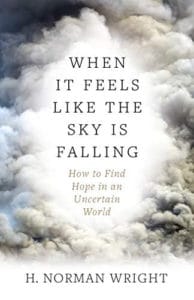John Fuller: Today on Focus on the Family we’re going to explore some of the pain and the loss that so many families are experiencing during this pandemic. Our guest, Dr. Norm Wright, shared this observation.
Excerpt:
Dr. H. Norman Wright: “We are all in the same boat. We are not all in the same storm. For some people, it’s sprinkling. This is a break. It’s a breather. It’s a rest, a pause, a time to reconnect with their families. Honestly, it’s kind of peaceful. But for some others, it’s a storm. It’s a bit scary. It’s disruptive. It’s enough to make you stay up and watch the news and worry a bit. For some, it’s a hurricane. It’s tearing at boards. It’s pulling off roofs. It’s washing them out to sea. It’s not wrong to be enjoying a sprinkle or enduring a storm. But please don’t negate the difference. Rest with your family, but don’t minimize the hurricane engulfing your neighbor. Laugh when you can but get on your knees for your friends.”
End of Excerpt
John: Well, it’s that a good reminder and perspective for us to consider. Welcome to Focus on the Family. Your host is Focus president and author Jim Daly and I’m John Fuller.
Jim Daly: John, suffering and grief are things that we never want to deal with. We don’t want to talk about it or think about it to be honest. And when we see others suffering or grieving, I think if we’re honest, we kind of are grateful or thankful that we’re not going through what they’re going through. Even though we’re willing to pray for them. But quietly we’re thinking, “Lord, thank You. I’m not going through that.” But guess what? In reality, there’s no exemptions in this life. You are going to go through something that is going to cause you grief and difficulty, a sense of suffering at some point. There’s no get out of jail card in this life. And I know as an orphaned child, I felt that. There were lonely days and I can relate to that. I am grateful to the Lord that things have been straighter and, in that way, easier for me and for my own family. But a lot of families are going through difficult experiences right now with the coronavirus. There’s loss of job, loss of income, shuttering of businesses, all kinds of things. Maybe the loss of a loved one. And that is the reality. Some families are going through tragic loss like I said. In today’s program, we’re going to help you think about it and maybe deal with it in your own life or maybe for those around you.
John: Yeah, we all know of or have read stories of heartache and loss and difficulty. And it’s really important for us, Jim, to be able to speak into this topic today.
Jim: It’s so true, John. And we’ve invited Dr. Norm Wright back to the program. Listeners respond so well to Dr. Wright, his tenderness, his experience as a grief counselor. He has helped many, many people. He was there at 9/11. He helped with Hurricane Katrina victims and even some recent high profile shootings. Dr. Norm Wright has been there. Norm, you were with us a little over six months ago talking about your book When It Feels Like the Sky is Falling: How to Find Hope in an Uncertain World. I think we’re experiencing that today. The sky has fallen and many of us are struggling with what’s next. Let me in that kind of environment welcome you back to Focus on the Family.
Norm: Thank you. It’s always a privilege to be here. The book you’ve mentioned When It Feels Like the Sky is Falling, I felt the Lord was leading me to write that during the time of Las Vegas and everything that happened there. And now I’ve discovered, no, it wasn’t just for that event, it’s for what’s going on right now.
Jim: That kind of proves the point, doesn’t it, Norm? That, um, you wrote it for that circumstance in Las Vegas and here we are a few years later, back at another tragic moment. The – I guess the theme of that is life has these times where things happen that we can’t control and we’ve got to lean into God, hopefully, and not lean into our anxiety.
Norm: But this is part of the problem. We like to feel as though we’re in control of our life, that we can handle everything. And we’ve been taught in a very dramatic way recently that it doesn’t work like that. We are more victimized than we realize. I had two people give me their feedback in terms of what was going on and this was what they said, “The world isn’t as it was. It doesn’t make sense. And I feel stripped of all security…”
Jim: Hmm.
Norm: “…It’s terrifying to think that disaster could strike again at any moment and destroy my life or the lives of those I love.” And then somebody else wrote, “Everything is different now. I really live life now. I’m not just existing. I appreciate the important things. I can’t say I’m happy for what happened, but my life is now richer and fuller.”
John: Hmm.
Norm: And you – you’re going to find all sorts of different responses to what is occurring at this particular point.
Jim: Let me let me hit that quickly. The different responses. I mean, we’re made in God’s image. We have personality traits. There’s, you know, predictive models. You can take a personality profile and your, you know – the DISC test comes to mind, Myers-Briggs, these things. We have predictable behavior because I think God created us that way. We have extroverts, introverts, et cetera. But explain, if you can, Norm this difference in responding to difficulty, the one that the sky is falling, the other saying, “I feel closer to God than ever before.”
Norm: Many times, it goes back to a basic attitude that we have. I think of James chapter one. “Count it all joy, my brethren, when you encounter various trials for the trying of your faith produces endurance or patience.” My wife and I lived on that particular verse for almost 23 years with our son who was profoundly disabled. And, uh, just holding on to that verse made a big difference in our lives because we connected with what the Word of God had to say. Sometimes, though, we get distracted and a lot of people that are distracted right now because their livelihood has been taken away from them and they never expected this. And, um, they’re really struggling. And we don’t have answers right now. And this is something that, um, – it’s difficult for us to deal with because we are people that want to know this is what to do. This is how to do it. And we go on from there. It’s not working that way. Every day we hear the newscasts and sometimes people are spending too much time listening to it because they don’t have all the answers either.
Jim: Right. It becomes overwhelming. Norm, one of the things – and I’m guilty of this. You know, generally speaking, Jean and I, our two boys are with us – Trent was off to his first year college living in an apartment, but he’s come back a month or so ago. And generally, it’s been a positive experience for us. Thankfully, none of us are sick, but we’re at home. We’re playing lots of board games. We’re having fun. We’re laughing a lot. We tend to go to our own corners of the house for a while when we need a little space. But the reality is, and this is where I want to go with that setup – is there are things going on that you’ve heard about. That you’ve experienced. Because in hospitals, for example, people who are struggling, who are passing away not just from the coronavirus, but from other things, there’s a separation from their loved ones at that moment of transition from this life to the next. I think you had a story about a New York physician who held a cellphone for a patient to talk to their loved ones, right?
Norm: Yes. They did. How would you handle what this person had to deal with? A physician held a cell phone to the hospital bed of a 100-year-old Jewish mother so her son could say goodbye. Part of the problem of what’s going on was that we don’t have the opportunity to say goodbye.
Jim: Hmm.
Norm: And because of that, there’s no closure there. We feel like we’ve been cheated out of an opportunity. And our hearts go out to the people that are in the hospital or in the rest home at this particular time, but we need to perhaps see situations like this as basically a prayer guide. We should pray for every situation. We should pray as we watched the governors on the television. And that gives us a better connection at this time. Funerals are being changed. We have Zoom funerals, delayed burials. Virtual goodbyes. And we have gone to that because it’s replaced the hugs, the shared sorrow, the holding of hands. Part of the problem that happens in a situation like this is our emotions. Our feelings are all over the map. They’re either out of control or they’re numb, the emotions. Um, and we’re not going to respond normally. If you live in a family do not expect them to respond as they did a month ago, three months ago, et cetera. You have to come up with how you’re going to respond to them at this particular time because, well, for one thing, people don’t realize that they are in grief. Most families are in grief at this particular time, especially if they’ve lost a job and they’re just waiting day after day when they’re able to go back to work. And some of them will not go back to work or they will go back, and it will be half the salary that they used to have. I mean, our life has been torn apart. And um…
Jim: Well, and you’re right over the next few weeks, we’re going to see, you know, how government works. How the redeployment of opening up the country will – what it will look like. You know, all 50 states probably doing it slightly differently. The governors are going to have quite a bit of control, I guess, in that regard. Let me mention one story, not – primarily because I want our listeners to think about the first responders and the pressure that they’re under. I think it was an Alabama nurse who, you know, because of the separation with the family, the family couldn’t come in and be around the grandmother who was passing away. And the nurse held the grandmother’s hand and assured her of her future with Jesus. And I just felt like when she came out of that hospital room where their loved one had passed away, she was able this nurse – she was able to express to the family that she was with her at that point of death, that she didn’t die alone. What a comfort that would be for a family member to know that somebody who’s very busy – they have a lot of responsibility right now – was kind enough to stop and to consider humanity there and to give that woman the holding of a hand as she took her last breath. I mean, that takes my breath away. It tears me up…
Norm: It does. And…
Jim: …To think that that’s happening.
Norm: …Well, the phrase “she didn’t die alone” is so important because it’s difficult in the dying process anyway. But then to feel isolated and to maybe even see your loved ones standing out in the hall. But you can’t – they can’t come in to touch you or anything. This is going on every day. I’m in the group of the first responders. I’m a chaplain at a trauma center. And, um, some of the stories that we end up dealing with there are very, very hard. They’re very difficult. And especially when you feel immobilized. There are things that we would like to be able to say and do and yet, because of the difficulty of this disease, we can’t do it.
Jim: Yeah.
Norm: One of the things that you can do with all the gadgetry we have nowadays of Zoom and Facebook and everything – there can be more opportunity for connections. And that’s what we should have to start looking at and maybe in our prayer lives say, “Lord, show me which ones to reach out to. Show me what I can say.” If you don’t know what to say when you are going to see a loved one, talk it over with somebody else so it’s not just you that’s dealing with this.
Jim: Yeah. You know, Norm, when I think about it, it shows you the design of God in our hearts that we need connection. We need relationship. It’s how we’re wired because we’re made in His image. That’s what He intended for us. He created us for a relationship with Him. And, uh, when these relationships are – are broken, when the tether is cut, it’s interesting that it creates fear and anxiety and other kind of, um, odd behaviors in us. But am I looking at that in the right way? It disrupts us to the point that we’re not functioning in the way that we were created to function.
Norm: I couldn’t say it any better than you did.
John: Hmm.
Norm: Um, somebody gave me a reading called The Storm. And I’d like to share it because it really captures what people are experiencing.
Jim: Sure.
Norm: And it went like this. “We are all in the same boat. We are not all in the same storm. For some people, it’s sprinkling. This is a break. It’s a breather. It’s a rest, a pause, a time to reconnect with their families. Honestly, it’s kind of peaceful. But for some others, it’s a storm. It’s a bit scary. It’s disruptive. It’s enough to make you stay up and watch the news and worry a bit. For some, it’s a hurricane. It’s tearing at boards. It’s pulling off roofs. It’s washing them out to sea. It’s not wrong to be enjoying a sprinkle or enduring a storm. But please don’t negate the difference. Rest with your family, but don’t minimize the hurricane engulfing your neighbor. Laugh when you can but get on your knees for your friends.”
Jim: Wow, that’s good. That is really good.
Norm: That really says it, doesn’t it?
Jim: It does beautifully, actually. And it gives you perspective, which is, I believe, what they are trying to achieve with that. Let me move to another topic. There’s a – certainly a spirit of fear that the culture is experiencing right now. To those that are watching a lot of the news and the concerns that we have and maybe it’s your family member. You’re managing it well, but, you know, others in your family or extended family aren’t. What are some ways for us to deal with that fear either in ourselves or in our family members? Should we – and what can we do to help others with their fears?
Norm: First of all, realize that everybody is going to grieve differently.
Jim: Mm hmm.
Norm: The way in which you grieve yourself, it’s part of who you are, your personality and what you’ve learned and everything. Somebody else is going to be different. And that helps. You made reference to the book When It Feels Like the Sky is Falling. The last chapter is all about fear. And, um, I’m encouraging everybody to read this book because it deals with what’s going on now and it really is helpful with the fear that is there. The last chapter is all on fear. And I like people to have something that’s practical. And so, what I usually do is people that have fear or worry is to take a three-by-five card and on one side of the card, write the word “Stop.” Then on the other side of the card, turn it over and write on it Philippians 4:6-9, “Don’t worry about anything, but with everything with prayer and supplication let your requests be made known unto God.” Carry that card with you. When you start to worry, when you start to allow the fear to overwhelm you, go back and take the card out, (Laughing) And in a good loud voice say, “Stop! Stop!” Then turn it over and read Philippians 4:6-9. I have been sharing that for probably 40 years…
Jim: Hmm.
Norm: …And there are thousands of card-carrying worriers and fearful people around that, uh, it has really, really made a difference…
Jim: Yeah, and it…
Norm: …Um, to apply God’s Word to our life.
Jim: And it feels like that is good self-talk, which is important to remind yourself of the promises of God, et cetera. But you also encourage people to be direct with the Lord. To speak to God about your concerns. Sometimes people, Norm, can feel uncomfortable with that, as if God is not big enough to take your pain or to take your emotions. But He wants that dialog, doesn’t He? Especially for those…
Norm: He wants it.
Jim: …Who are feeling, uh, angry at God.
Norm: Well, the anger is a cry of protest against what’s going on in our life at this time. And it’s important is to say, “God, I am really upset with You. This should never have occurred. I don’t understand. Help me deal with my lack of understanding.” Be as specific, as detailed as you possibly can. And taking the burden off of our back and putting it upon the Lord because He really does understand. The Word of God is a textbook on grieving. And it’s so important that we, every one of us, listening to this program understand what grief is. I carried this little book with me wherever I go, and I give it out constantly and I wish everybody listening would read Experiencing Grief. And then this book When It Feels Like the Sky is Falling to take in information, because we live in a culture that does not teach people about loss. It does not teach people about grief. And that makes it so much more difficult. People today don’t realize that if they lost their job or they even can’t go back to school, you’re dealing with some major losses in your life. My granddaughter can’t go through, um, graduation because of what’s going on. And that’s a big loss for her, especially after losing both mom and dad.
Jim: Hmm.
Norm: And so, I wish something could be different there. And so, we have to come up with some other alternative and think about it. But we have to be honest, too, and say, “Here’s what I’m struggling with. This is something here that is, uh, probably the worst possible experience I’ve ever had in my life. Where do I go with this? What can I learn through it?” And that phrase, “what can I learn through this experience?” is so critical. And once you’ve identified it, talk to another family member. “What are you learning at this time through this experience? Think about it.” And don’t pressure him to come up with the answer right away because if they’re an introvert, they can’t do that. They have to think it through. And that’s all right. And, um, involve other individuals. We need to stay connected with our support system and actually expand it and build a bigger one at this particular time. And, um, we’ve talked about or I’ve talked about on the emotions, don’t stuff them because it won’t work.
Jim: Yeah.
Norm: Let it out. Write it out. Talk to somebody and tell somebody if you’re going to share it, “Oh, I really don’t need to have anybody respond to this. I just want you to listen. That’s all I ask. Listen.”
Jim: Yeah.
Norm: And the anxiety that you engage in, that’s a normal response, but we can learn how to calm it down. And we write it down. People struggle with sleep at this time. It’s important to, uh, look to the Scriptures. One of the things that we do, um – I have people set on the side of the bed and this eight or 10 Scripture’s on sleep and we have them read these out loud because that gets to your brain in a cognitive/visual way as well as to um, hearing it in an auditory way. And then we have a prayer that we have people read on the other side. And, uh, there are so many people who have been able to just break the chain of non-sleeping simply by going through the Word of God and this prayer. And we just give this out all the time. And, uh, it really makes a difference when you can just really bring the spiritual dimension into your life. Um…
Jim: Oh, without a doubt. Yeah, definitely. Let me ask you this age-old question. But in this context, you know, it’s the present. It’s what it is. Some people have asked me, and I wrote an op-ed about this, but, you know, where is God in this coronavirus? Does God create this and allow it? Or, you know, where is God in this? And why does He either allow or create these circumstances for people to suffer? And why would that be the case? Why would a good God do this? Let me give you the best shot as a trained counselor and a Christian, a person who believes in Jesus. What’s the answer to that?
Norm: I wish I knew the answer to that. I know there is an answer. I don’t know when I will find out what it is. There’s a lot of people that are saying, “This is what happened. This is why it happened, et cetera, et cetera.” I don’t know that.
Jim: Hmm.
Norm: But I can go to Him and say, “I need clarification, Lord. I need understanding. Show me the Scriptures. Show me what I can look at.” And that’s when I go back to the Scriptures and to the different chapters in the books and I read them over and I admit, I’m at a loss for words. This might be what is occurring, but I have to be cautious, not adamant, not dogmatic.
Jim: Hmm.
Norm: And just make our lives more dependent upon Him and realize that, um, there’s not going to be clarification for some time. Because I think this is going to go on. It’s not going to be over in another month, another three months or so. Our lives have been changed drastically.
Jim: Yeah. And, Norm, I so appreciate the fact that people who have deep roots in their relationship with God are usually the ones that don’t have the answers and don’t try to express that they do. Because I think the deeper you go at the Lord, you know, the more you have to rely on faith and the more complicated these things are. We don’t understand all these things, but what we do know is the Lord wants relationship with each one of us. He wants us to grow toward Him in this life so that when we get to Him in the next life, there’s a depth of relationship, friendship, bond that we have with God that endures all things. Especially those things that we’ve encountered here. And you’ve expressed it so well. You’ve lived it. You’ve had to do this not just tell people or express to people good ways to do it. You’ve had to do it. And I deeply respect that, Norm. Thank you for being with us today.
Norm: Thank you for the privilege.
Jim: Let me turn to you now. If you’ve been experiencing these moments of grief, panic, fear, whatever it might be. We are here for you at Focus on the Family. And I’m grateful that we are able to work from home. Our I.T. department, man, they were on it. They were already creating a plan in case there was a catastrophic loss on the campus. So, we were ready. And we’re working from home. The counselors, the phone folks are there to take your call. So, do that. Take us up on that. If you’re feeling a little off, a little something’s not right. Anxiety, fear, whatever it might be. Call us. Let us talk to you and if necessary. We do have caring Christian counselors who can call you back and talk with you and hopefully refer you to someone in your area or provide some resources for you to read and consider. So that’s part of what we do here at Focus on the Family. We don’t simply want to talk at you. We want to have dialog with you and have a relationship with you so that you can grow in Christ and grow in this life in a way that honors Him. So, take us up on that. We have Norm’s great book, When It Feels Like the Sky is Falling. And John will give the details on how to get that.
John: Well, that’s right, Jim, we do have that in stock. We’re happy to send that out to those who would like a copy. I think Norm is right. It’s going to be months and months of dealing with grief and loss. This is going to be applicable for the rest of this year into next year. Life has changed. Learn how to deal with it. Norm’s book, again, is called When It Feels Like the Sky Is Falling: How to Find Hope in an Uncertain World. We have that, as I said. Our number is 800, the letter A and the word FAMILY. Or stop by focusonthefamily.com/broadcast.
Jim: And John, as we often do, we want to get this resource into your hands. Dr. Norm Wright is so deep and thoughtful. And this book, is so good and so right for this moment. Send a gift to Focus of any amount and we’ll send you a copy of Norm’s book to say thank you. If you cannot afford to do that right now, we get it. We understand the circumstances people are in. Get in touch with us. Give us your details and we’ll get a copy of the book out to you trusting that others will take care of that expense. And the core thing is we want to take care of that grief that you’re feeling that loss that you’re feeling that fear and anxiety and Norm’s resource here will do a lot to move you in that direction.
John: So, donate and get Norm’s book when you call 800, the letter A and the word FAMILY. And you can also at that time ask to speak with one of our Christian counselors. We’ll set up at time for that to happen. You can also visit focusonthefamily.com/broadcast. On behalf of Jim Daly and the entire team here at Focus on the Family, thanks for joining us today. I’m John Fuller inviting you back as we once again help you and your family thrive in Christ.




















